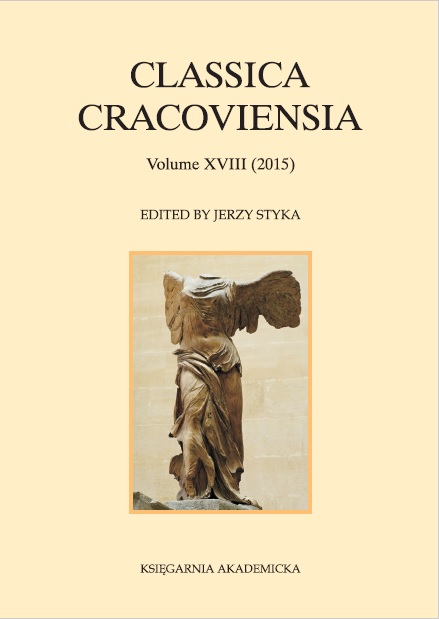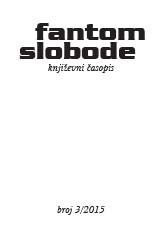


Keywords: Plutarch's Table Talk; Athenaeus' Deipnosophists; literary symposion; Greek Imperial prose
This paper compares accounts of Senecio's actions in Plutarch's Table Talk with the relation of Larensis' comportment in Athenaeus' Deipnosophists. The results of the examination suggest that the extent of self-awareness of both characters is what should be understood as the symbolic accommodation between Greek and Roman in the High Empire times.
More...
Keywords: old comedy; aischrology; shame; obscenity; personal abuse
This paper examines the impact of verbal abuse typical of the old Attic comedy on the reputations of real-life citizens of Athens. It can be argued that the way in which comic poets insulted well-known people of their age shared many characteristics with the communicative strategies applied in everyday familiar speech. This may indicate that the only proper reaction to it consisted in accepting the ridicule as if it were not offensive.
More...
Keywords: Arrian; Plutarch; biography; history; preface; polemics
It is usually maintained that the main object of Arrian’s criticism in his Anabasis are the historians of Alexander the Great. In the following I would like to argue that one of the writers Arrian criticized was also Plutarch of Chaeronea who wrote an influential biography of the Macedonian king. Although Arrian never referred directly to Plutarch’s Life of Alexander, he read not only many historical works on the king but used and criticized other accounts, called by him ta legomena (‘tales’). To this latter group Plutarch’s vita Alexandri should be included as well.
More...
Keywords: Modern Greek literature; Modern Greek folk poetry; demotic songs; Modern Greek folklore; folk eschatology; personification of Death; Byzantine eschatology; Byzantine orthodoxy; reception of Antiquity
In my paper I focus on the well-known John Cuthbert Lawson’s study about Modern Greek folklore (1910) and I venture to verify if it may be regarded as a reliable source of information about Greek folk beliefs. I base my argument on the eschatological remarks Lawson made concerning the personification of Death – Charos and his relationship to the Christian Angels. Confronting Lawson’s views and his source material with other similar demotic songs, mainly from the collections he had had access to, I try to show in what way the older collections of folk-songs might have distorted or falsified the eschatological images of Charos and the Angels, and what he overlooked while analyzing the sources. I also shed some light on possible influences of Byzantine orthodoxy on Modern Greek folk tradition to which Greek demotic songs belong.
More...
Keywords: intellectual; erudition; persuasion; classics; Late Antiquity
The question of Gregory’s of Tours awareness of the persuasive potential of his learning he demonstrates in his works is discussed. The Touronian bishop’s high evaluation of the erudition of other men is clearly shown and juxtaposed with his opinion concerning his linguistic competence. Gregory’s ability to embellish his style, being a sign of the literary training is demonstrated. His degree of acquaintance with the classical literature is assessed and his familiarity with Latin poetry is underlined. The literal meaning of his statements concerning classical literature as detrimental to a Christian soul is contrasted with the subtle and indirect play those statements engage his readers in; their implicit meaning is shown to contradict their direct significance. Various examples of Gregory’s efforts to display his erudition in the field of literature and his high degree of learning, including a fair number of erudite digressions are brought forth. Gregory’s unambiguous statement concerning the intention with which he inserted them into his text is evoked. Finally, the Touronian Bishop’s positive judgment about his audience’s capacity of properly evaluating the erudite content of his writing is demonstrated and corroborated with the external evidence provided by contemporary sources.
More...
Keywords: Isocrates; ethical ideal; its relativity and consistency
The purpose of this paper is to present the views of Isocrates on human excellence as a result of the educational process. The author examines some passages in Isocrates’ speeches, in which the well formed human virtue seems to be changeable and still dependent on the pupils’ social position. Apart from the fact that this virtue occurs as a faculty of seizing each opportunity to speak in a relevant way, it also appears to be once a kind of patience in bearing any success as well as any misfortune in the same manner, and, at other times, it presents itself as a type of activity of the mind, which seeks the best solutions to different problems of the State. It is argued that in the view of Isocrates, despite some relevancy in his model of human excellence, which must be adapted to the future social tasks of each of his pupils, human perfection always entails three most important values. Apart from speaking well at the right time and living agreeably with other people, this perfection is based, to a large extent, on some form of seriousness and a gravity of the mind, which remains totally independent of any opportunities of time.
More...
Keywords: Greek literature; literary experiments in Hellenistic poetry; Philicus
The Hymn to Demeter (SH 676-80) by Philicus of Corcyra can be viewed as a combination of new and traditional features. It contains a proclamation of novelty, but, at the same time, it is rooted in the hymnic tradition; the traceable characteristics of the conventional hymn, however, are considerably modified by Philicus and practically require redefinition. What seems particularly worth emphasising is the poet’s receptiveness to other than hymnic modes of expression as well as intertextual allusions ranging in time from the archaic period to the present day. Philicus’ poem (dw#ra) is “brought” to the grammatikoi, a specific group of recipients whose opinions must have counted so much that the poet decided to address to them his hymn on par with the gods. Although it is a truism to say that the ancient hymn composers took into account two communicative settings, one formally adopted (the author/performer – the god) and one resulting from the circumstances of their performance (the author/performer – the audience/readers), it is Philicus’ merit to state explicitly what the other poets used to leave implicit. The innovativeness of Philicus’ hymn is clearly visible also in Iambe’s speech, quoted in the last part of the preserved text (SH 680.56-62).
More...
Vratio se, svakako prije nego što sam ga očekivao. Sporo je gradio svoju koloniju, razmnožavao se parazitno i okrepljujuće. Jedan od njegovih okota nekim je nevjerojatno čudnim okolnostima ponovno prešao na mene. Čak smo neko vrijeme i živjeli zajedno, rekao bih u određenom strahopoštovanju, strpljenstvu. Međusobno uvažavanje trajalo je sve dok mene, aminokiselinu, nije odlučio izjesti. Taj proces je spor, lišen strasti i neodlučnosti, poput matematike. Napao me matematički i neprestano. Tako su mi rekli liječnici. Moje nepriznavanje njegove prisutnosti trajalo je dugo, a kada sam postao svjestan njegovih namjera i odlučnosti, njegov osvajački pohod već je zauzeo popriličnu površinu mojeg teritorija.On se ne boji gotovo ničega, jer iskustvo je ipak pokazalo da ga jedna stvar može usporiti, hodanje po pločicama. Ali ne bilo kakvim pločicama, već one moraju biti kvadratične, s fugom debljine tri milimetra, zelene, masne, bolničke. Hodanje po takvim pločicama mora biti krajnje oprezno, da se parazitsko tijelo ne bi osjetilo napadnuto. Korak nikako ne smije biti veći od sedamdeset centimetara, jer onda nepotrebno razgibavamo tijelo i povećavamo napadnuti volumen. Za takvo hodanje najbolje su papuče. Tanke papuče, pamučne, kao kod bolesnika. Hodati treba oprezno, slijedeći precizne upute. Mimoilaženje s drugim ljudima na hodniku mora biti bez međusobnog gledanja u oči i bez razgovora. Uljez se treba na pločicama osjetiti usamljeno i izgubljeno.
More...
Probudio se ranije nego inače. Goga je za danas najavila čišćenje, a to je značilo da se svatko od njih mora pozabaviti svojim dijelom posla, htjelo mu se to ili ne. Njegov dio bilo je pranje prozora i podova s tim da nije smio zaboraviti na terasu, najvažniji dio stana. Terasa se, upozorila je Goga naglašavajući zadnju riječ, prlja najviše.
More...


Na psihotestu sam imao jedno matematičko pitanje gdje je trebalo odgovoriti koliko je dijete naslijedilo očeva novca. To dijete iz pitanja imalo je i majku i brata i sestru, ali su, kaže zadatak, brat i sestra poginuli u prometnoj nesreći i tu se sve komplicira, jer sad treba sračunati koliko od sveukupne sume ide majci, a koliko preživjelom potomku, ali ne mogu se više sjetiti ni sume ni postotaka koji su ih zapadali, sjećam se samo da je na mom psihotestiranju to dvoje djece poginulo.
More...
Prvi snijeg bi u Poljskoj uvijek napadao početkom prosinca, u muklom i skrivenom središtu duge zimske noći, naglo kao da se razlio pejzažom. Samom događaju, toj preobrazbi krajolika nikad nitko nije svjedočio. Zaspali bismo sklupčani pod pernatim poplunima i sanjali svečanost na kojoj su nam davno umrli bake i djedovi u vrčeve ulijevali mirisno vino glasno se smijući vunenim smijehom od kojeg je bilo ispleteno djetinjstvo.
More...



Lakrimologija je, kao vrlo mlada znanost, posvećena suzama i plakanju. Ubrzano se razvija te razmatra i pomaže u liječenju fenomena povezanih sa suzama, plakanjem i sličnim suzećim pojavama, visoko specijalizirana doktrina sa strogo znanstvenim i metodičkim pristupom plakanju, razrađenom terminologijom i kategorizacijom, rječnikom i intervjuima u kojima se ispitanike podvrgava ispitivanju vezanom uz plakanje. Primjerice, koliko plačete, kada plačete; korespondencija između događaja i plakanja: postoji li ili ne postoji, mali plač za malu ranu, veliki plač za veliku ranu; zatim, nepodudaranje događaja i plakanja — to je onaj unutargenerativni, samoporađajući plač; onda kvantiteta i kvaliteta plača — je li onako rijedak ili obilan, više poput kapljica ili potoka; kakva mu je boja; kakvog su okusa suze, imaju li onaj pun, zaokružen vinski bouquet ili su više razvodnjene, okusa destilirane vode.
More...
— Odmor? To vi zovete odmor? — upitao nas je naš domaćin Beso Kharabadze zadnjeg dana našeg boravka u njegovom kućnom smještaju. Zadnji dan u Gruziji shvatili smo da nemamo isprintane karte za Budimpeštu pa smo na putu prema smještaju otuđili nekoliko listova iz printera u kamenitom ulazu nekog hostela nalik tunelu. Nitko nas nije vidio, nitko nas nije čuo, pljačka papira nikad se nije dogodila. Prazan papir nije krađa, mislio sam dok smo letjeli natrag u Budimpeštu. Papir ispunjen riječima bi mogao biti, ovisno o sadržaju. Papiri su nas na tom putovanju uporno izbjegavali, ta stvar od koje se u našoj civilizaciji ne može pobjeći i koja nam kroji sudbine. Papir nije dao da pišem po njemu tijekom boravka u Gruziji, papiri se nisu dali isprintati prije polaska u Budimpeštu i bojimo se da će nam praviti probleme pri odlasku.
More...
Keywords: Ante Tomić;
U veljači 2014. piscu Anti Tomiću, koji je u svome Splitu sjedio s društvom u nekom kafiću na otvorenom, netko je prišao i na nj istresao kantu ljudskih izmetina, po svoj prilici vlastitih. Počinitelju toga »atentata govnima« (kako su događaj podrugljivo nazvali Tomiću neskloni novinari) policija još uvijek nije uspjela ući u trag, a prema prostački napadnutom Tomiću hrvatska kulturna javnost nije pokazala puno sućuti — osim što je vjerojatno PEN izdao nekakvo suhoparno prosvjedno priopćenje.
More...